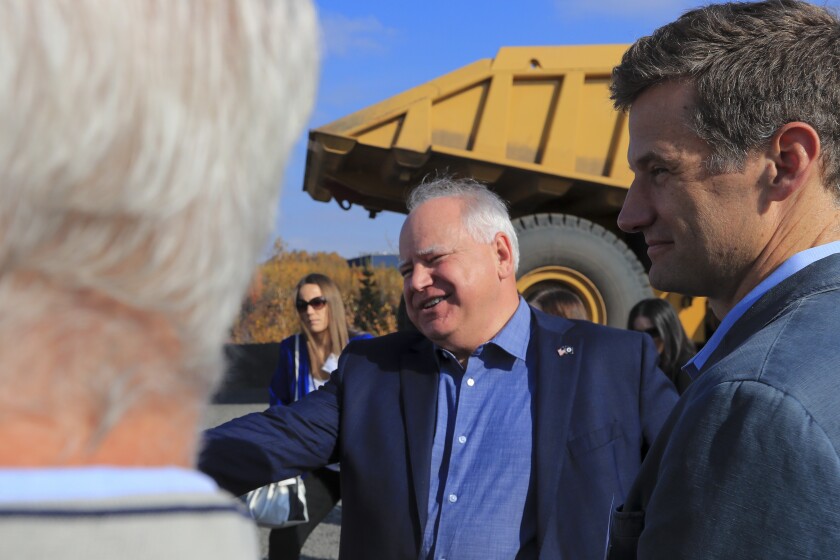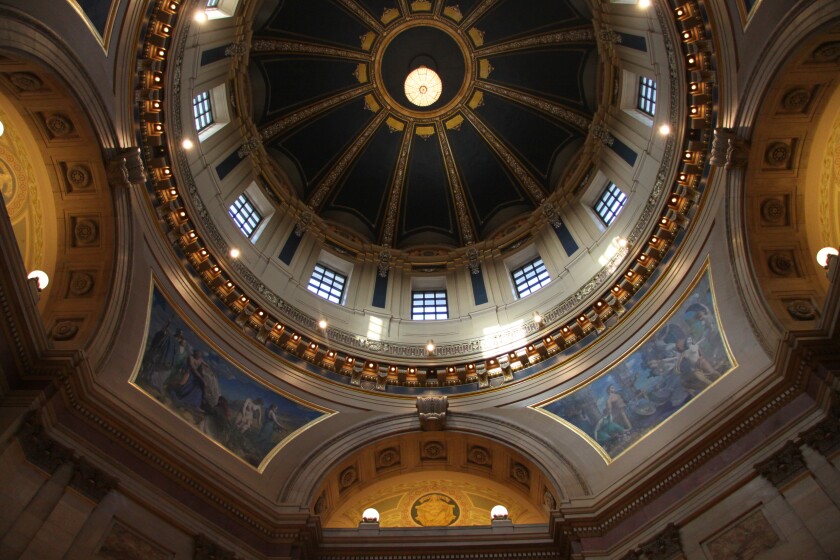ST. PAUL — A $65.2 billion two-year budget proposed by Minnesota Gov. Tim Walz would include direct checks of up to $2,600 for 2.5 million Minnesota households and cuts to the Social Security income tax.
The final piece of Walz’s budget, released Tuesday, Jan. 24, would represent a 26% increase from the last two-year budget, and includes what the governor touted as the biggest tax cut in state history for the “greatest number of Minnesotans across the spectrum.” Overall, the budget would result in $8 billion in tax cuts for families and older Minnesotans.
ADVERTISEMENT
“This is a balanced budget, but it's far more than that. It is a transformational budget,” Walz told reporters Tuesday as he, Lt. Gov. Peggy Flanagan and state commissioners presented the budget to reporters at the Department of Revenue in St. Paul.
“Minnesota has always been progressive in its taxation with an expectation that people pay their fair share, and those that have more pay their fair share, too,” he continued. “And all of us benefit from that.”
The governor is required to make his budget recommendations to the Legislature in January of each odd year. But the final budget is the product of negotiations between lawmakers and the governor.
Walz released details of his “One Minnesota” budget recommendations in four installments.
Last week, he presented a $12 billion proposal aimed at education and family assistance and a $4 billion package focused on economic development. While the proposals have been largely fiscal, they have also carried some policy recommendations.
As part of a public health and safety plan released Monday, the governor proposed $300 million in local public safety aid, but also included gun control proposals.
Walz’s new direct payments proposal would cost the state about $3.9 billion. Walz pitched direct payments in the last legislative session, though so far, the proposal has been met with a lukewarm reception by Democratic-Farmer-Labor legislative leaders.
ADVERTISEMENT
Under Walz’s new budget proposal, families earning less than $150,000 a year would get $2,000 and single filers earning less than $75,000 a year would get $1,000. The payments would come through an income tax credit. In cases where the direct payments are paired with a state benefit for families with children, a household with three kids could get up to $2,600.
Taxes on Social Security income would not be completely eliminated under the Walz plan, but the budget proposal calls for $219 million to reduce the tax level for more than 350,000 Minnesota households. DFL lawmakers have been hesitant on cutting Social Security income taxes because it would cost the state roughly $500 million to eliminate. Republicans support getting rid of the tax altogether.
Legalization of adult-use cannabis also appeared in the governor’s budget recommendations this year. Walz is again calling for legalization and the creation of an Office of Cannabis Management to regulate cannabis and hemp-derived products. A legalization bill is moving through the Legislature.
Much of the budget increase would be one-time spending that pulls from the state’s historic $17.6 billion budget surplus, though GOP lawmakers and the Minnesota Chamber of Commerce were quick to note the significant spending jumps and criticized the governor for creating other new taxes and using the surplus to expand government spending.
New taxes include new capital gains taxes and a 0.7% payroll tax for a paid family and medical leave program that business groups say will create $1 billion in new taxes.

“If we can't cut taxes now, when can we?” House Minority Leader Lisa Demuth, R-Cold Spring, said at a Capitol news conference following Walz’s budget announcement.
Demuth said Republican leaders will look into working with Democrats to fully repeal the Social Security income tax.
ADVERTISEMENT
DFL lawmakers, who now have majorities in both the Senate and the House, will craft the state budget, and it’s likely the final budget will look different from Walz’s initial proposals. The state has a historic $17.6 billion surplus, but much of that money — about $12 billion — will only be available once and will not carry over into future surpluses. The exact numbers could also change after the Department of Revenue releases another budget forecast in February. Minnesota’s most recent two-year budget was more than $50 billion.
House Speaker Melissa Hortman said DFL lawmakers in the House are behind the governor’s overall vision.
“I commend the governor for proposing a bold budget with an inspirational vision for our future,” she said in a statement.
Other items included in the budget include $377 million to pay off U.S. Bank Stadium in Minneapolis, which would mean the project would be paid off more than 20 years ahead of schedule, potentially saving the state $220 million in interest payments.
In response to the Walz budget, the Coalition of Greater Minnesota cities said it was disappointed with the proposed level of local government aid. The coalition ahead of session said it hoped for a $150 million increase to LGA, but Walz in his recommendations called for $30 million. Thief River Falls Mayor Holmer, president of the coalition, issued a statement calling on lawmakers and the governor to do more to help smaller cities across the state.
“LGA is critical to many Greater Minnesota cities, and we are still far behind where we need to be. If we are truly going to build strong communities in Greater Minnesota, LGA needs to be funded at a much higher level,” he said. “For ‘One Minnesota’ to become a reality, the state must do more to support communities across the state.”
The Minnesota Chamber of Commerce said the proposal called for too much new spending and taxes, and called for lawmakers and the governor to use the record $17.6 billion budget surplus to lower taxes and make Minnesota more competitive for business.
ADVERTISEMENT
“Now is the time to make Minnesota more competitive and invest in our economic future by lowering taxes and preventing costly mandates — not proposing a 26% increase in government spending and top-in-the-nation taxes,” including $1 billion in new payroll taxes, a metro sales area tax increase, a cannabis tax and the highest capital gains tax in the nation, chamber lobbyist Laura Bordelon said in a statement.
Follow Alex Derosier on Twitter or email aderosier@forumcomm.com .


























